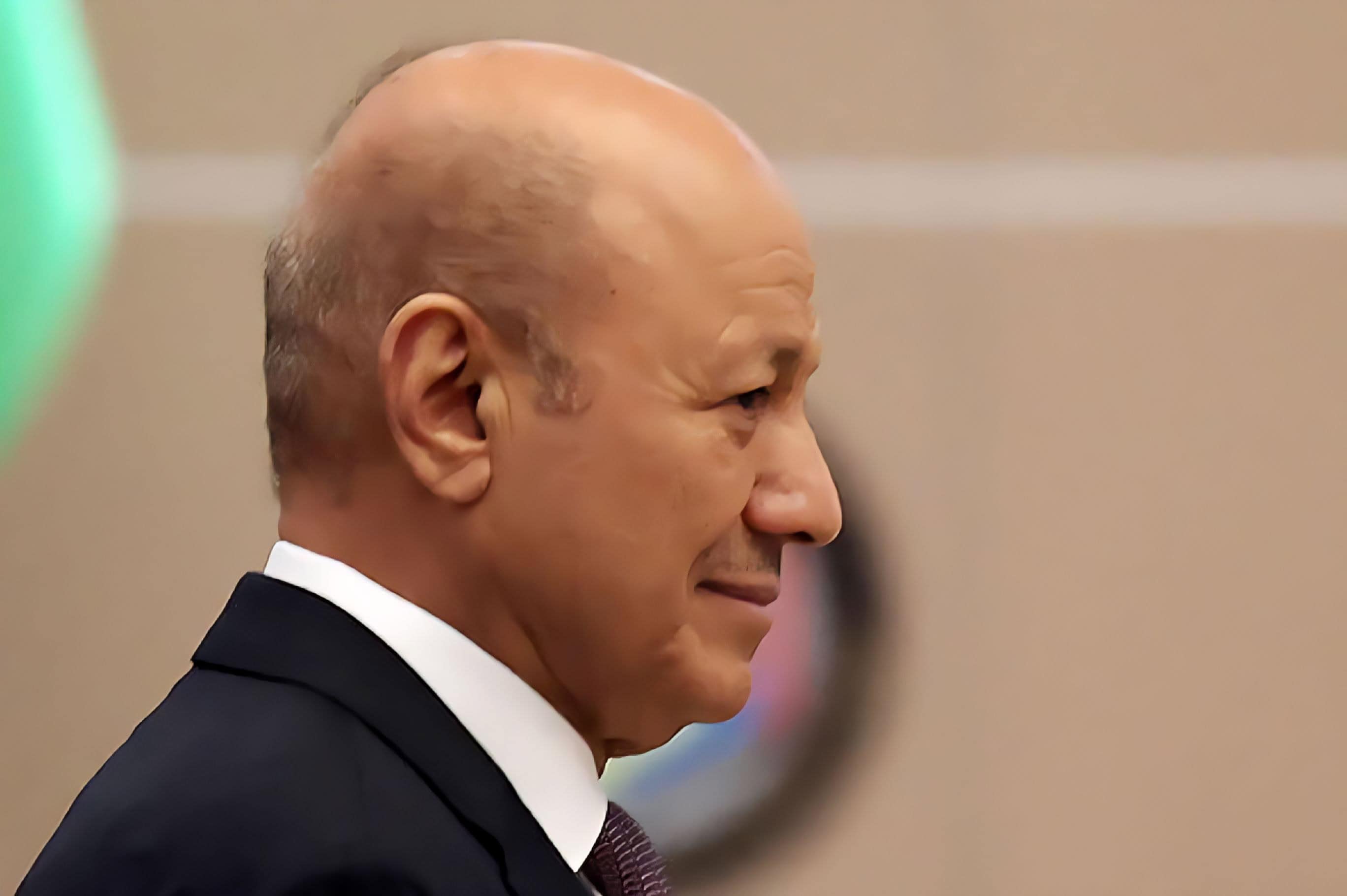
Rashad Al-Alimi (AFP)
Last updated on: 01-07-2024 at 7 PM Aden Time

Aden (South24)
Two informed sources told ‘South24 Center’ on Monday that the Chairman of Yemen’s Presidential Leadership Council (PLC), Rashad Al-Alimi, asked the management of the Central Bank in Aden and the Ministries of Transport and Communications to reverse recent measures targeting the Houthi economy.
According to the two sources, under Saudi pressure, Al-Alimi reportedly issued directives suspending the Central Bank’s punitive measures on commercial banks that failed to comply with the decision to move their headquarters from the Houthi-controlled Sanaa to the capital, Aden, in South Yemen.
Related: CBY announces measures targeting Houthi economy
The directives also ordered the retracting of the decision to transfer Yemenia Airways’ financial assets from Sanaa to Aden, including those in external accounts, as well as the decision announced by the Ministry of Communications to move the headquarters of mobile phone companies from Sanaa to Aden.
Sources did not provide further detail regarding the Saudi pressure to push the internationally recognized government to back down from the measures, but it is likely related to Riyadh’s desire to advance its bilateral plan with the Houthis.
Al-Alimi's move comes amid Houthi threats to launch a new war, the most recent being a post on the X platform by the Houthis' Deputy Foreign Minister Hussein Al-Ezzi.
Today, the Southern Giants Brigades announced that a Houthi attack on the Al-Jufra area in Al-Abdiyah district in Marib Governorate had been repelled, and dozens of the Houthis' members were killed.
This is the second attack in less than 48 hours after yesterday, Sunday’s attack against the Southern Giants Brigades on the Hays front on the Western Coast, during which the Houthis used Grad missiles, according to what was reported by the Southern Giants Brigades’ official website.
According to another informed source, the Southern Transitional Council (STC) instructed Southern ministers within the Yemeni government to continue implementing and finalizing the latest economic measures.
Among the 24 ministerial portfolios, the STC’s bloc includes the Ministry of Transport, the Ministry of Civil Service, the Ministry of Social Affairs, the Ministry of Electricity, and the Ministry of Fisheries and Agriculture.
The Minister of Planning and International Cooperation, closely aligned with the STC, now also serves as the Acting Minister of Communications following the previous minister’s death.
According to the source, Al-Alimi's plan was rejected by all PLC members during their last meeting on Friday, called by PLC member and STC President Aidrous Al-Zubaidi. The PLC Chairman's office did not respond to South24 Center’s request for comment.
According to what was reported by Saba Agency, the PLC meeting renewed “full support for all government economic measures to improve living conditions and rationalize spending, and in priority are the decisions of the Central Bank of Yemen aimed at protecting the banking system.”
These developments coincide with the resumption of negotiations between the Yemeni government and the Houthis in the Omani capital, Muscat, yesterday.
Related: New negotiations between Yemen's government and Houthis in Muscat
While the two parties describe the negotiations as being focused solely on prisoners of war file, Saudi media outlets states they will also address humanitarian and economic issues.
Yesterday, the office of the UN envoy to Yemen, Hans Grundberg, was quoted by Al-Masdar Online as saying, “There is no economic dialogue taking place in Muscat currently, and up to this moment no agreement has been reached regarding holding an economic dialogue in Muscat or elsewhere.”
Meanwhile, the US State Department said that the Special Envoy for Yemen, Tim Lenderking, is traveling to Saudi Arabia and the Sultanate of Oman this week, “to press for an end to the reckless Houthi attacks in the Red Sea, and the release of United Nations employees, diplomatic bodies, and international non-governmental organizations detained by the Houthis.”
In June, the Yemeni government introduced several measures in the banking sector, the transportation and communications sector, and for humanitarian organizations operating in the country, aimed at besieging the Houthis and curtailing their ability to finance wars in Yemen using revenues from these sectors.
The Houthis retaliated with their own measures, such as banning 13 banks, including two government ones, in Sanaa. They also hijacked three Yemenia Airways planes on Wednesday, preventing the airline from transporting Yemeni pilgrims returning from Saudi Arabia to Sanaa.
The Houthis had previously hijacked a Yemenia Airways plane, bringing the number of its planes in Houthi captivity up to four, out of the seven total owned by the airline, the only national carrier in the country.
This led to a major crisis in transporting Yemeni pilgrims from Saudi Arabia to their country, requiring Kuwait to support Yemenia Airways with three aircraft and two spare engines, as announced by the PLC Chairman yesterday.
In April 2022, Yemeni President Abd Rabbuh Mansour Hadi announced the transferral of his constitutional powers to the PLC, which consists of a council chairman and seven members representing anti-Houthi parties and factions.
South24 Center